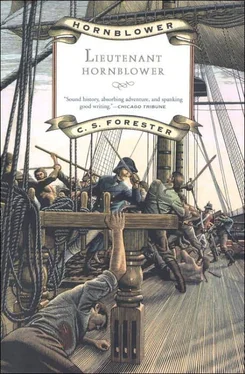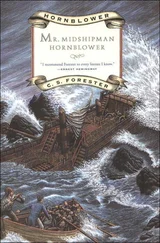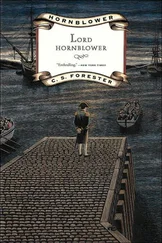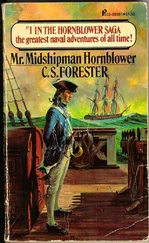Every possible man was drawn up on this Sunday morning on the maindeck, not merely the two watches, but every ‘idler’ who had no place in the watches—the holders, who did their work so far below decks that for some of them it was literally true that they did not see the sun from one week’s end to another, the cooper and his mates, the armourer and his mates, sailmaker and cook and stewards, all in their best clothes with the officers with their cocked hats and swords beside their divisions. Only the officer of the watch and his assistant warrant officer, the quartermasters at the wheel and the dozen hands necessary for lookouts and to handle the ship in a very sudden emergency were not included in the ranks that were drawn up in the waist at rigid attention, the lines swaying easily and simultaneously with the motion of the ship.
It was Sunday morning, and every hat was off, every head was bare as the ship’s company listened to the words of the captain. But it was no church service; these bareheaded men were not worshipping their Maker. That could happen on three Sundays in every month, but on those Sundays there would not be quite such a strict inquisition throughout the ship to compel the attendance of every hand—and a tolerant Admiralty had lately decreed that Catholics and Jews and even Dissenters might be excused from attending church services. This was the fourth Sunday, when the worship of God was set aside in favour of a ceremonial more strict, more solemn, calling for the same clean shirts and bared heads, but not for the downcast eyes of the men in the ranks. Instead every man was looking to his front as he held his hat before him with the wind ruffling his hair; he was listening to laws as allembracing as the Ten Commandments, to a code as rigid as Leviticus, because on the fourth Sunday of every month it was the captain’s duty to read the Articles of War aloud to the ship’s company, so that not even the illiterates could plead ignorance of them; a religious captain might squeeze in a brief church service as well, but the Articles of War had to be read.
The captain turned a page.
“Nineteenth Article,” he read. “If any person in or belonging to the fleet shall make or endeavour to make any mutinous assembly upon any offence whatsoever, every person offending therein, and being convicted by the sentence of the courtmartial, shall suffer death.”
Bush, standing by his division, heard these words as he had heard them scores of times before. He had, in fact, heard them so often that he usually listened to them with inattention; the words of the previous eighteen Articles had flowed past him practically without his hearing them. But he heard this Nineteenth Article distinctly; it was possible that the captain read it with special emphasis, and in addition Bush raising his eyes in the blessed sunshine, caught sight of Hornblower, the officer of the watch, standing at the quarterdeck rail listening as well. And there was that word ‘death’. It struck Bush’s ear with special emphasis, as emphatic and as final as the sound of a stone dropped into a well, which was strange, for the other articles which the captain had read had used the word freely—death for holding back from danger, death for sleeping while on duty.
The captain went on reading.
“And if any person shall utter any words of sedition or mutiny he shall suffer death…”
“And if any officer, mariner, or soldier shall behave himself with contempt to his superior officer…”
Those words had a fuller meaning for Bush now, with Hornblower looking down at him; he felt a strange stirring within him. He looked at the captain, unkempt and seedy in his appearance, and went back in his memory through the events of the past few days; if ever a man had shown himself unfit for duty it was the captain, but he was maintained in his position of unlimited power by these Articles of War which he was reading. Bush glanced up at Hornblower again; he felt that he knew for certain what Hornblower was thinking about as he stood there by the quarterdeck rail, and it was strange to feel this sympathy with the ungainly angular young lieutenant with whom he had had such little contact.
“And if any officer, mariner, or soldier or other person in the fleet”—the captain had reached the TwentySecond Article now—“shall presume to quarrel with any of his superior officers, or shall disobey any lawful command, every such person shall suffer death.”
Bush had not realised before how the Articles of War harped on this subject. He had served contentedly under discipline, and had always philosophically assured himself that injustice or mismanagement could be lived through. He could see now very special reasons why they should be. And as if to clinch the argument, the captain was now reading the final Article of War, the one which filled in every gap.
“All other crimes committed by any person or persons in the fleet which are not mentioned in this Act…”
Bush remembered that article; by its aid an officer could accomplish the ruin of an inferior who was clever enough to escape being pinned down by any of the others.
The captain read the final solemn words and looked up from the page. The big nose turned like a gun being trained round as he looked at each officer in turn; his face with its unshaven cheeks bore an expression of coarse triumph. It was as if he had gained by this reading of the Articles reassurance regarding his fears. He inflated his chest; he seemed to rise on tiptoe to make his concluding speech.
“I’ll have you all know that these Articles apply to my officers as much as to anyone else.”
Those were words which Bush could hardly believe he had heard. It was incredible that a captain could say such a thing in his crew’s hearing. If ever a speech was subversive of discipline it was this one. But the captain merely went on with routine.
“Carry on, Mr. Buckland.”
“Aye aye, sir.” Buckland took a pace forward in the grip of routine himself.
“On hats!”
Officers and men covered their heads now that the ceremonial was completed.
“Division Officers, dismiss your divisions!”
The musicians of the marine band had been waiting for this moment. The drum sergeant waved his baton and the drumsticks crashed down on the side drums in a long roll. Piercing and sweet the fifes joined in—‘The Irish Washerwoman,’ jerky and inspiriting. Smack—smack—smack; the marine soldiers brought their ordered muskets up to their shoulders. Whiting, the captain of marines, shouted the orders which sent the scarlet lines marching and counter-marching in the sunshine over the limited area of the quarterdeck.
The captain had been standing by watching this orderly progress of this ship’s routine. Now he raised his voice.
“Mr. Buckland!”
“Sir!”
The captain mounted a couple of steps of the quarterdeck ladder so that he might be clearly seen, and raised his voice so that as many as possible could hear his words.
“Ropeyarn Sunday today.”
“Aye aye, sir.”
“And double rum for these good men.”
“Aye aye, sir.”
Buckland did his best to keep the discontent out of his voice. Coming on top of the captain’s previous speech this was almost too much. A ropeyarn Sunday meant that the men would spend the rest of the day in idleness. Double rum in that case most certainly meant fights and quarrels among the men. Bush, coming aft along the maindeck, was well aware of the disorder that was spreading among the crew, pampered by their captain. It was impossible to maintain discipline when every adverse report made by the officers was ignored by the captain. Bad characters and idlers were going unpunished; the willing hands were beginning to sulk, while the unruly ones were growing openly restless. “These good men,” the captain had said. The men knew well enough how bad their record had been during the last week. If the captain called them ‘good men’ after that, worse still could be expected next week. And besides all this the men most certainly knew about the captain’s treatment of his lieutenants, of the brutal reprimands dealt out to them, the savage punishments. ‘Today’s wardroom joint is tomorrow’s lowerdeck stew,’ said the proverb, meaning that whatever went on aft was soon being discussed in a garbled form forward; the men could not be expected to be obedient to officers whom they knew to be treated with contempt by the captain. Bush was worried as he mounted the quarterdeck.
Читать дальше









